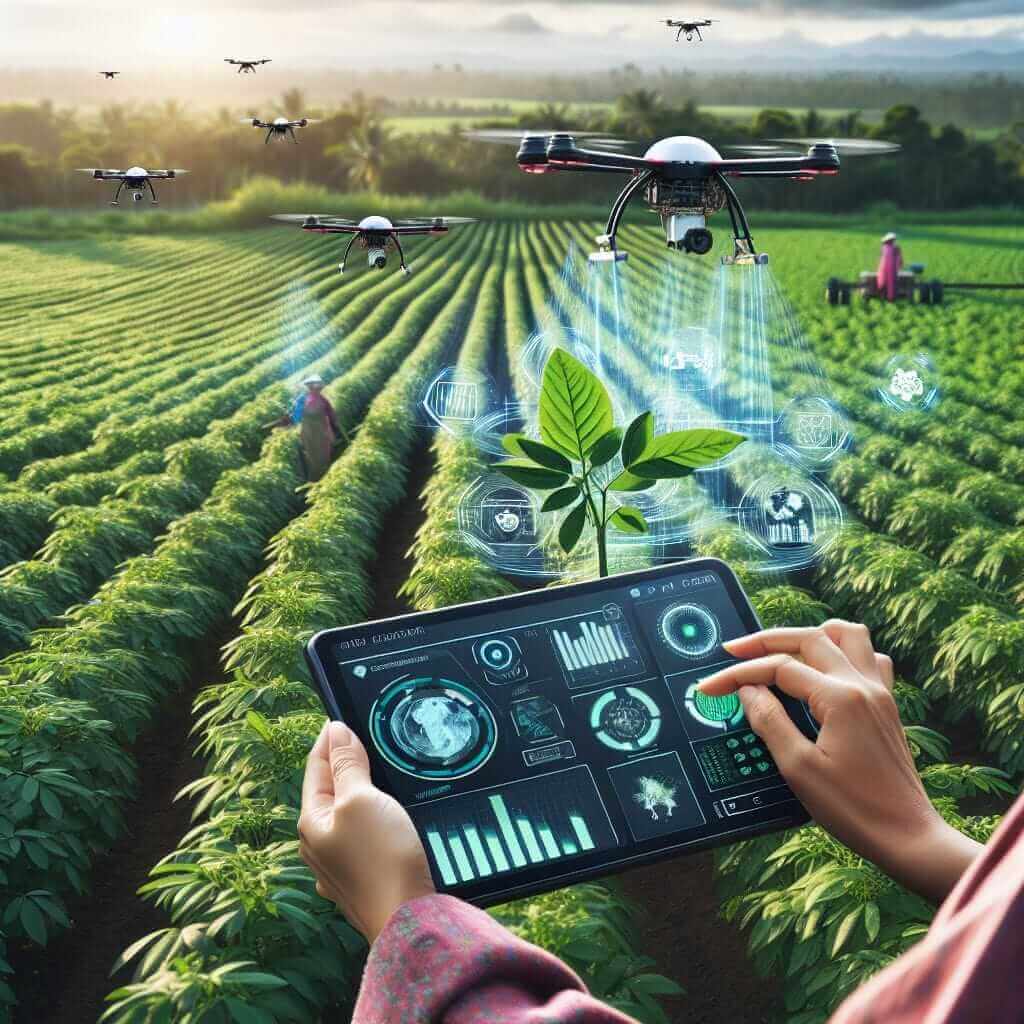The IELTS Reading test challenges examinees with a variety of academic texts and diverse question types. One recurrent theme in recent IELTS exams is the use of technology, particularly Artificial Intelligence (AI), across different sectors. Given its contemporary relevance, particularly in optimizing agricultural supply chains, this topic has repeatedly emerged in IELTS reading passages. Understanding and predicting such trends can substantially aid your preparation for the exam.
This article provides an IELTS-style Reading practice test, focusing on “How is AI being used to optimize agricultural supply chains?” The practice material aims to enhance your reading comprehension skills, familiarize you with the format of actual IELTS questions, and improve your vocabulary and grammar competence.
Practice Test: AI and Agricultural Supply Chains
Reading Passage
AI has profoundly affected various industries, including agriculture, by optimizing the supply chains which significantly contribute to improving efficiency and productivity. The incorporation of AI technology within the agricultural sector has encompassed several areas, including but not limited to crop monitoring, supply chain logistics, and predictive maintenance.
Crop Monitoring
Utilizing AI for crop monitoring involves collecting and analyzing data from various sources like satellites, drones, and ground sensors. This data helps in assessing crop health, detecting diseases early, and predicting yield. For instance, AI algorithms can identify specific crop stress signs that might elude the human eye, thus ensuring timely intervention and minimizing the risk to overall production.

Supply Chain Logistics
AI plays a pivotal role in the logistics of the agricultural supply chain. Optimizing routes for transportation, managing inventory levels, and predicting market demand are a few of the many tasks that AI handles efficiently. Machine learning models analyze historical data and current trends to forecast the demand and price fluctuations, enabling farmers and distributors to make informed decisions.
Predictive Maintenance
Another crucial application of AI in agriculture is in the maintenance of machinery. Predictive maintenance employs AI algorithms to predict equipment failures before they occur. This is particularly significant for large-scale farming operations where machinery downtime can lead to substantial financial losses. AI tools monitor the machinery’s condition and schedule maintenance activities proactively, thus ensuring uninterrupted operations.
Questions
Multiple Choice
-
According to the passage, how does AI contribute to crop monitoring?
a. By replacing the need for human intervention entirely
b. By analyzing data from satellites, drones, and ground sensors
c. By predicting market trends for crop prices
d. By reducing the overall yield -
What is a key benefit of using AI in supply chain logistics?
a. Reducing the need for transportation routes
b. Predicting market demand and price fluctuations
c. Identifying crop stress
d. Ensuring machinery defects
True/False/Not Given
- AI can only be used in the transportation aspect of agricultural supply chains. (True/False/Not Given)
- Predictive maintenance helps in scheduling machinery repairs in advance. (True/False/Not Given)
Sentence Completion
- Crop health can be monitored by analyzing data from , , and ___.
- Machine learning models analyze historical data and _____ to forecast demand and price fluctuations.
Answer Key and Explanations
Multiple Choice Answers
-
b. By analyzing data from satellites, drones, and ground sensors
- This is explicitly mentioned in the passage as one of the ways AI contributes to crop monitoring.
-
b. Predicting market demand and price fluctuations
- The passage details how AI can predict market demand and price fluctuations, which helps in making informed decisions.
True/False/Not Given Answers
-
False
- The passage explains that AI is used not just in transportation but also in inventory management and other logistics-related tasks.
-
True
- This is mentioned in the passage, highlighting how AI schedules maintenance activities proactively.
Sentence Completion Answers
-
satellites, drones, and ground sensors
- These are mentioned as sources for data collection in AI-powered crop monitoring.
-
current trends
- The passage mentions that machine learning models use historical data and current trends to make forecasts.
Common Errors and Tips
Common Errors
- Misunderstanding Context: Make sure to fully understand the context of how AI helps in various functions rather than assuming based on general knowledge.
- Skipping Details: Pay attention to details such as the specific roles of AI in logistics and maintenance.
Vocabulary
- Encompassed (verb) /ɪnˈkʌmpəsd/: included or covered.
- Logistics (noun) /ləˈdʒɪstɪks/: the detailed organization and implementation of complex operations.
- Predictive (adjective) /prɪˈdɪktɪv/: relating to or having the effect of predicting an event or result.
Grammar
- Relative Clauses: “Utilizing AI for crop monitoring involves collecting and analyzing data from various sources like satellites, drones, and ground sensors, which help in assessing crop health…”
- Complex Sentences: “Predictive maintenance employs AI algorithms to predict equipment failures before they occur, ensuring uninterrupted operations.”
Advice for High IELTS Reading Scores
- Practice Regularly: Familiarize yourself with different text types and question formats by practicing regularly.
- Expand Vocabulary: Broaden your vocabulary, especially on contemporary topics like technology and agriculture.
- Enhance Reading Speed and Accuracy: Work on reading quickly but accurately, focusing on understanding the main ideas and supporting details.
By following these tips and practicing with targeted reading passages, you’ll be better prepared to handle the complex topics that may appear on the IELTS Reading test.